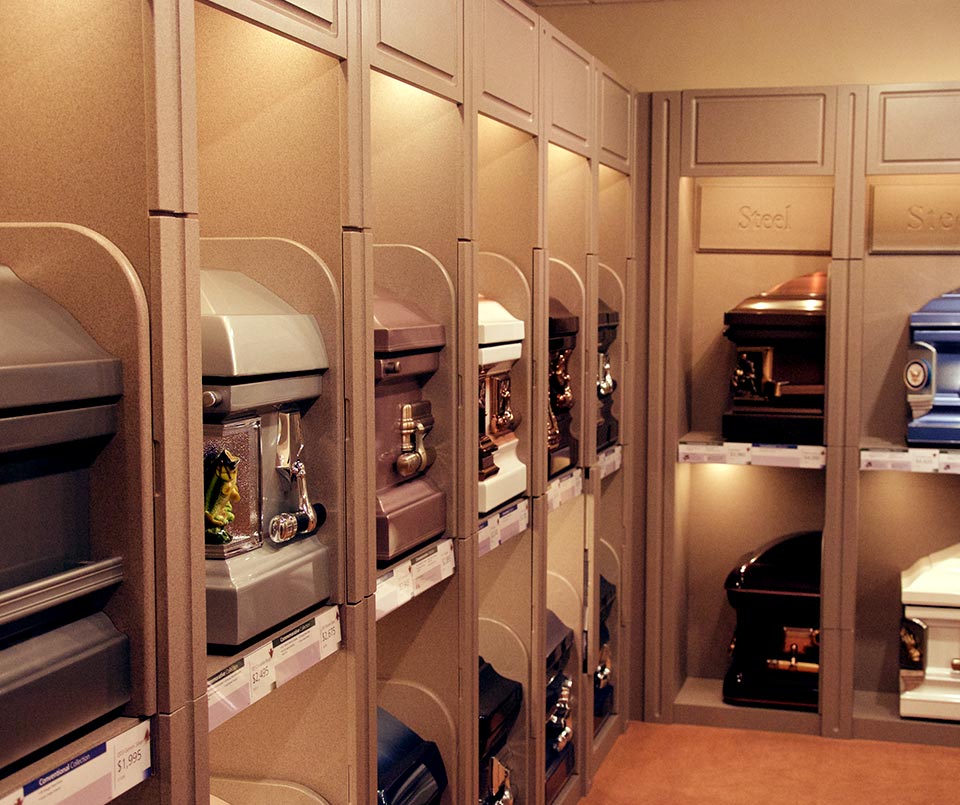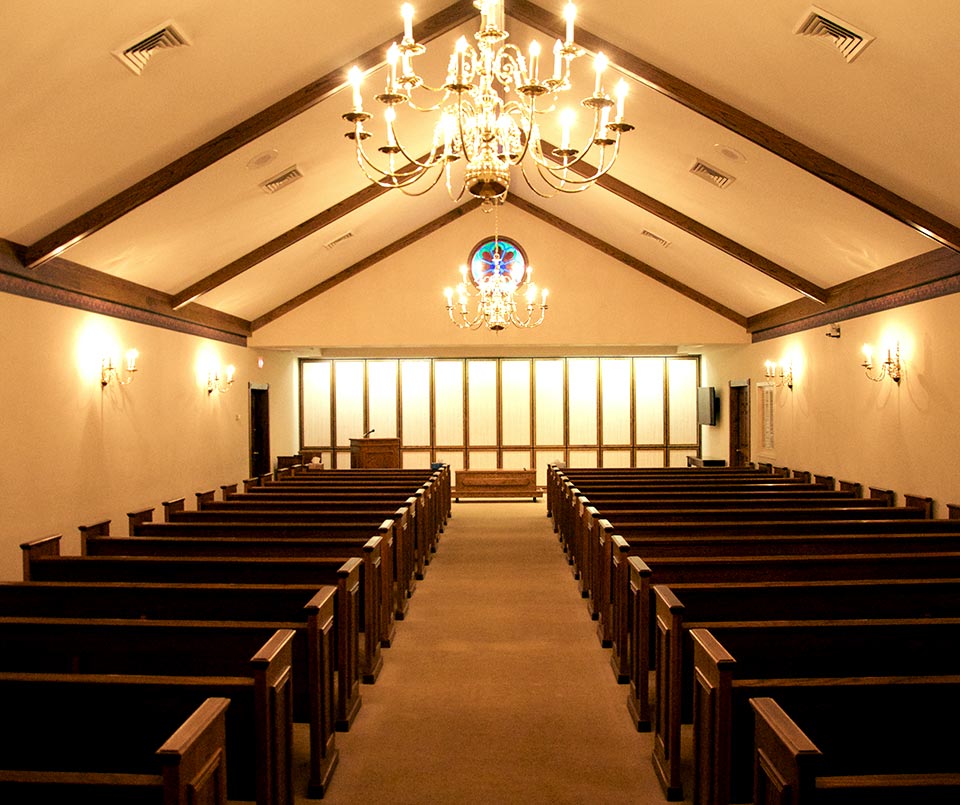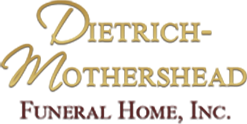If you’ve found yourself responsible for organizing a recently deceased loved one’s affairs and all other post-death arrangements, you may be unsure of where to begin. At Dietrich-Mothershead Funeral Home, we’re here to support you in this time of grief with professionalism and care. We’ll answer any questions you may have and ensure everything is just how your loved one would have wanted.
Searching for an Obituary?
To view our current and past listings click here.
 Immediately After the Death
Immediately After the Death
1. Depending upon the location of the person’s death…
- If the person is in a hospital or nursing home, then you don’t need to call anyone or do anything until the medical professional confirms the death and permits you to take the next steps.
- If the person is somewhere that is NOT considered a medical facility, then call the first responder (911). They will take care of everything leading up to the confirmation of death. After this point, it depends upon if the cause of death is apparent. Additional legal processes or investigations may be required. You will have to wait until a medical examiner or coroner permits you to take the next steps. The protocol can be subject to change based on the municipality or state where the death occurred. The aforementioned is the most common of procedures.
2. Contact the funeral home
If your loved one completed pre-planning activities, the funeral home may already be selected. If that’s not the case, then you’ll need to select one yourself based on what you believe your loved one would want.
While location of the funeral home is certainly a consideration, keep in mind that your funeral director will be helping you through the difficult time. It’s in your best interest to choose a funeral director you are comfortable working with, rather than simply relying upon convenience or location.
You may also take advice from trusted friends or family when selecting a funeral director and learning about their reputation. Once you have contacted the funeral directors, they will transfer the body to the funeral home for final preparation. If you are experiencing this difficult time in your life, contact Dietrich-Mothershead Funeral Home for compassionate and experienced funeral service planning.
Back to Top
Contact Us
We’ve made it easy to send your email inquiries via our contact form. Delivered in minutes, your message will not sit in our Inbox for long. We guarantee to respond within one business day.
Contact Us Today to Request a Quote The Funeral Director Consultation
The Funeral Director Consultation
3. Consult with a funeral director
The consultation, also known as the funeral arrangement conference, will occur as soon as possible after the passing of your loved one. Many arrangements are discussed and agreed upon with the help of the funeral director during this time, such as the following:
- General funeral plans
- The death certificate
- The obituary
- Payment
- Signing of the contract
Those in the meeting include spouses or any immediate family members who have the authority to make decisions.
4. Prepare the death certificate
The first phase of the consultation includes gathering information for the funeral director to prepare a death certificate. The death certificate is an important document used by those who work with financial institutions, pensions, estates, and other matters on behalf of the deceased. After receiving the necessary information, the funeral director will then forward it to a medical professional who completes the medical portion of the death certificate. Then, it will be filed with the local registrar.
Have the following information at your disposal for the death certificate:
- Complete proper name
- Birth certificate
- Birth date
- Birthplace
- Social Security number
- Parents’ names, including mother’s maiden name
- Method of disposition (burial, cremation, anatomical donation, etc.)
- Level of education attained
- Home address
- Place of death
- Any relevant family history
5. Writing the obituary
Having all of the above information on hand will also assist you in writing the obituary. The funeral director will certainly help if you have never written one before.
Obituaries typically follow the format below:
- A short biographical sketch
- Any accomplishments
- Immediate family members, either living or deceased
- Funeral date, time and location
- Where to send any gifts or donations in memoriam
The funeral director may also provide a worksheet that simplifies the information gathering process. For example, take a look at our “A Personal Guide for My Family and Loved Ones” worksheet.
Guidelines for Writing the Memorial6. Arrange the payment
Many funeral homes offer safe and secure methods of paying for services before they’re needed. Your funeral director will provide you with the firm’s price list during the funeral arrangement conference.
Following the conference, you’ll be given an itemized list of funeral expenses. The funeral director will additionally discuss payment for the services provided. They can also assist you in making claims on life insurance or other benefits that may be available to assist with funeral expenses.
 The Funeral Service
The Funeral Service
7. Begin making arrangements for the funeral
During the consultation, the funeral director will also help you plan any type of funeral or memorial service. The planning phase may include:
- Notifying local media outlets or social media groups
- Coordinating with other local groups, such as religious institutions or other facilities that may hold a service, gathering, etc.
- Contacting the cemetery, if necessary
8. Choose the form of disposition
Simply put, disposition describes the final resting place of the deceased. Although some individuals and groups have strong opinions on final disposition, your funeral director will work with you to honor your loved one’s wishes. Options include:
- Burial
- Cremation
- Anatomical donation
9. Choose the type of funeral service
The type of funeral service may depend upon the final disposition. Funeral service types include:
- Traditional Burial — This is when the casket with the body is present. It can be either formal or casual, religious or secular. Whatever your wishes, the funeral director can help plan a funeral service designed to create a meaningful tribute to your loved one. Oftentimes, traditional services move to a gravesite. Your funeral director will also help coordinate additional transportation to another site if that is your intention.
- Memorial — This is when the body of the deceased person is NOT present during the gathering of family, friends, and community at a chapel, church, or other location. For example, if the body is cremated, there may be an urn with the remains present as well as a display of photo(s) and other items representing hobbies, awards, and accomplishments.
- Veteran Funeral — A veteran funeral service is a memorable way to honor those who served in the Armed Forces. Traditional veteran funerals typically include a gathering of friends and family followed by a graveside ceremony. Your funeral director will help you make arrangements with the national or state veterans cemetery if you so choose. Other traditions include the presentation of the flag and the playing of “Taps.”
10. Choose the time and date of the service
There is no best practice for scheduling the time and date of service. The timeframe is subject to the availability of loved ones, the church, or venue. Your funeral director will assist you in scheduling the service.
11. Ideas for the funeral service
Leading up to the service, your funeral director will work with you and your loved ones to discuss and implement your wishes.
Items to consider:
- Music
- Photographs for display
- Funeral video
- Funeral programs
- Flower arrangements
- Scripture readings
- Guestbook
- Transportation before, during, and after the service
- Who will perform certain tasks, such as reading scripture, giving the funeral sermon, presenting the eulogy, and being pallbearers
12. Contact friends and family
Once most decisions are finalized, contact whomever you wish to attend the service, and arrange their transportation if needed. An obituary notice or a social media post may also help those outside of your contact circle to become aware of the service.
Back to Top
 Begin to Heal
Begin to Heal
A funeral service is more than just saying goodbye – it’s a way to begin the healing process after a loved one has passed. It also presents the opportunity to tell their story and express the values of a life well-lived. By gathering as a community in an orderly and supportive environment, the grieving process becomes less of a burden and more of a joyful celebration!
When you’re navigating the difficult process of planning a funeral, you need service that is both experienced and compassionate. Our staff is here to help before, during, and after you have experienced a loss. Contact us today for compassionate, empathic, and professional funeral services in De Soto, Hillsboro, Festus, Herculaneum, and surrounding municipalities.
CONTACT US Here To Help You
Here To Help You
![]()
Funeral Director
Your loved one’s life should be honored in a way that would make them proud. Our team of caring, compassionate funeral directors is available to help 24 hours a day to help you add the personal touches that celebrate their life.
![]()
Funeral Services
Whether you want to honor your loved one with a casual ceremony or a formal one, our services allow all in attendance to express their heartfelt gratitude for the role the person played in shaping their life.
![]()
Cremation Services
We provide memorial service options for loved ones who choose cremation over a traditional burial. All of our cremation services include assistance with the permanent placement of the urn at a cemetery or columbarium.


